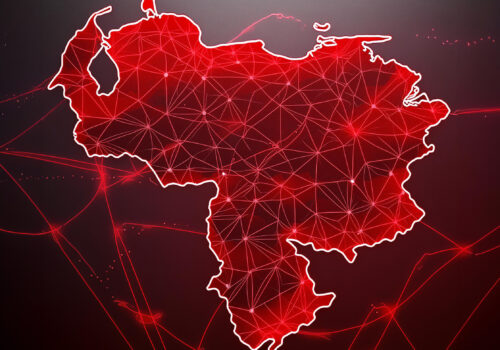Authoritarian reach and democratic response: A tactical framework to counter and prevent transnational repression
Bottom lines up front
- Foreign interference (FI) and transnational repression (TNR) represent a fundamental challenge to the international rules-based order by employing tactics that exist below the threshold of armed conflict while violating national sovereignty.
- Beyond national borders, authoritarian states have targeted policymakers, elected officials, researchers, journalists, activists, and diaspora communities worldwide to advance their political objectives.
- These TNR tactics encompass cross-domain operations, including surveillance, cyberattacks, disinformation, legal and judicial harassment, and physical and psychological assault.
Transnational represssion (TNR) represents a growing threat to democratic societies worldwide, as authoritarian regimes extend their repression beyond borders, utilizing covert and overt influence operations to advance their political objectives. Over the past decade, the term “transnational repression” has been used to describe the actions of states that seek to control populations living outside their borders. University of Notre Dame Professor Dana M. Moss coined the term to refer to “the repression of diasporas by home-country regimes,” which aims to “punish, deter, undermine, and silence activism in the diaspora,” thereby preventing these populations from completely exiting authoritarian control.
State, state-affiliated, and non-state actors employ a range of coercive strategies to silence critics, alienate opposition, and control diaspora communities via intimidation. TNR manifests into a sophisticated blend of operations, including surveillance, cyberattacks, disinformation campaigns, legal and judicial harassment (sometimes called lawfare), and even physical and psychological assault. As these operations often exist in legal gray zones, they exploit vulnerabilities within liberal democracies, challenging the international rules-based order below the threshold of major pushback from the international community. Despite growing efforts and attention toward the issue, democracies have struggled to counter these extraterritorial repression tactics effectively.
When foreign governments conduct surveillance, intimidation, or enforcement actions—including through the exercise of extraterritorial police power by authoritarian regimes inside the nations they target—they undermine state sovereignty and threaten to erode public trust in institutions, representing a significant national security threat.
A strategic framework on transnational repression is urgently needed to confront this rapidly evolving global threat. While the body of research and policy responses has been slowly developing over recent years, these actions remain largely fragmented, reactive, and uncoordinated. What is lacking is a unifying, practical framework that consolidates these efforts and provides a comprehensive, proactive approach to understanding, disrupting, preventing, and countering transnational repression.
As resources to support activists, journalists, and diaspora communities targeted by TNR come under increasing strain— exacerbated by the growing absence of sustained US leadership and funding in this domain—the need for a common strategic framework is more urgent than ever. In this context, a unified framework to guide Western democratic allies will foster greater coherence and coordination, while also supporting the accelerated development, implementation, and effectiveness of policies and countermeasures. By providing a shared foundation for identifying threats, protecting vulnerable communities, and confronting the foreign regimes that engage in TNR, such a framework would strengthen collective democratic resilience at a time when it is most critically needed. Ultimately, the goal is to establish a global, whole-of-society approach that fosters collective responses across like-minded democracies.
Rather than reinventing an entirely new architecture, the objective of this framework is to extend and enhance the utility of existing frameworks by tailoring their components to the specific dynamics of global TNR. This includes integrating elements that account for current policy gaps, diaspora vulnerability mapping, coordinated policy responses, and civil society resilience.
By understanding the objectives and TTPs of transnational repression, this project aims to propose actionable countermeasures to disrupt, deter, and prevent future TNR operations at various stages through a comprehensive framework.
Read the full report
About the authors
Marcus Kolga is a journalist, human rights activist, and a Canadian analyst of foreign disinformation and influence operations. Kolga founded DisinfoWatch.org in 2020 to monitor and analyze foreign disinformation targeting Canada. He is a senior fellow at the Macdonald-Laurier Institute Center for Advancing Canada’s Interests Abroad, The CDA Institute, and the Raoul Wallenberg Center for Human Rights.
Sze-Fung Lee is an independent researcher specializing in Chinese hybrid warfare, including Foreign Information Manipulation and Interference (FIMI), Grand Strategy, Gray Zone Tactics, and Cognitive Warfare. Zir research also focuses on Indo-Pacific security policy, challenges posed by emerging technologies, and the politics of Hong Kong.
Iria Puyosa is a senior research fellow at the Atlantic Council’s Democracy+Tech Initiative. She specializes in the complex interplay between technology and political dynamics. For over a decade, Puyosa has investigated information operations that undermine democratic institutions and fuel political instability. Her work uncovers the multifaceted threats of digital authoritarianism and contributes to a deeper understanding of the challenges facing democracies in the digital age.
Kenton Thibaut is a senior resident China fellow at the Atlantic Council’s Digital Forensic Research Lab (DFRLab), where she leads China programming for the Democracy + Tech Initiative, and a resident senior fellow at the Atlantic Council’s Indo-Pacific Security Initiative (IPSI) at the Scowcroft Center for Strategy and Security.
Lisandra Novo is the senior law & tech advisor for the Strategic Litigation Project at the Atlantic Council. The Strategic Litigation Project works on prevention and accountability efforts for atrocity crimes, human-rights violations, terrorism, and corruption offenses around the world.
Related content
Explore the programs

The Atlantic Council Technology Programs comprises five existing efforts—the Digital Forensic Research Lab (DFRLab), the GeoTech Center, the Cyber Statecraft Initiative, the Democracy + Tech Initiative, and the Capacity Building Initiative. These operations work together to address the geopolitical implications of technology and provide policymakers and global stakeholders necessary research, insights, and convenings to address challenges around global technology and ensure its responsible advancement.

The Atlantic Council’s Digital Forensic Research Lab (DFRLab) has operationalized the study of disinformation by exposing falsehoods and fake news, documenting human rights abuses, and building digital resilience worldwide.

The Democracy + Tech Initiative creates policy practices that align global stakeholders toward tech and governance that reinforces, rather than undermines, open societies. It builds on the DFRLab’s established track record and leadership in the open-source field, empowering global communities to promote transparency and accountability online and around the world.
Image: Illustration by Donald Partyka

